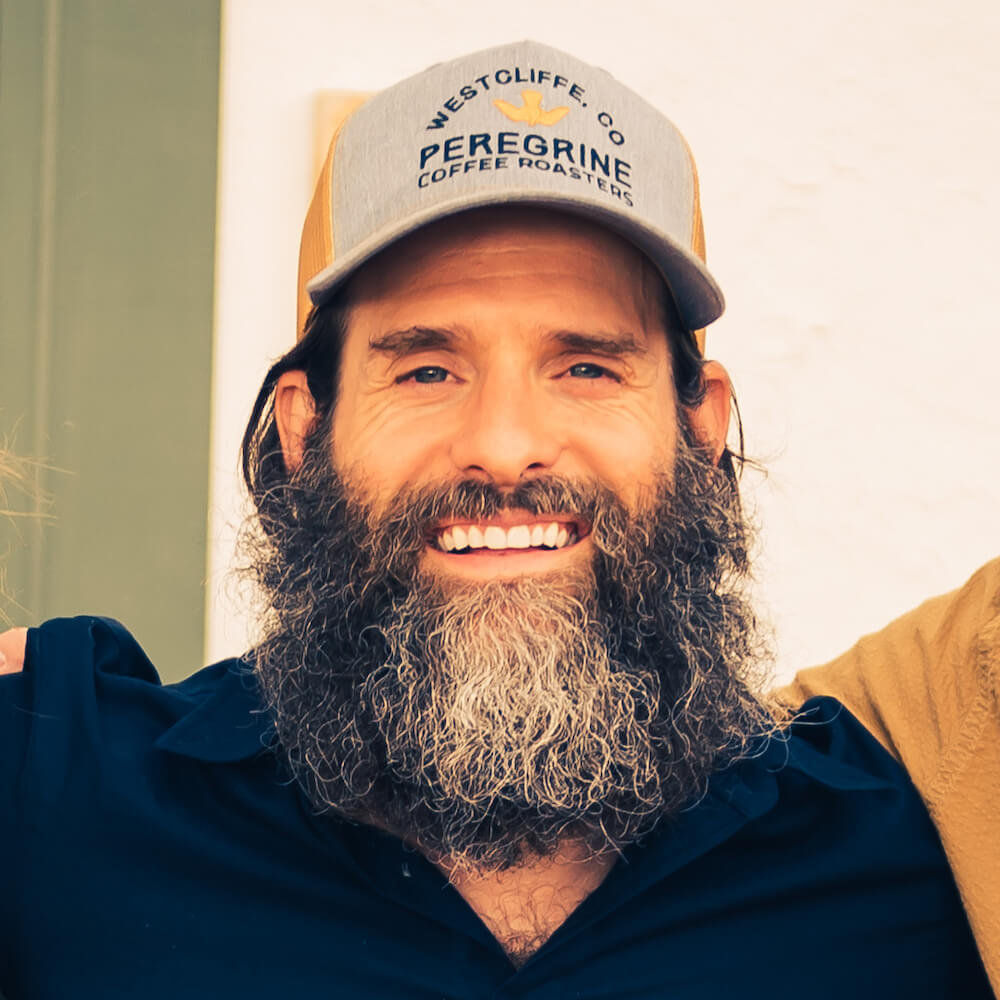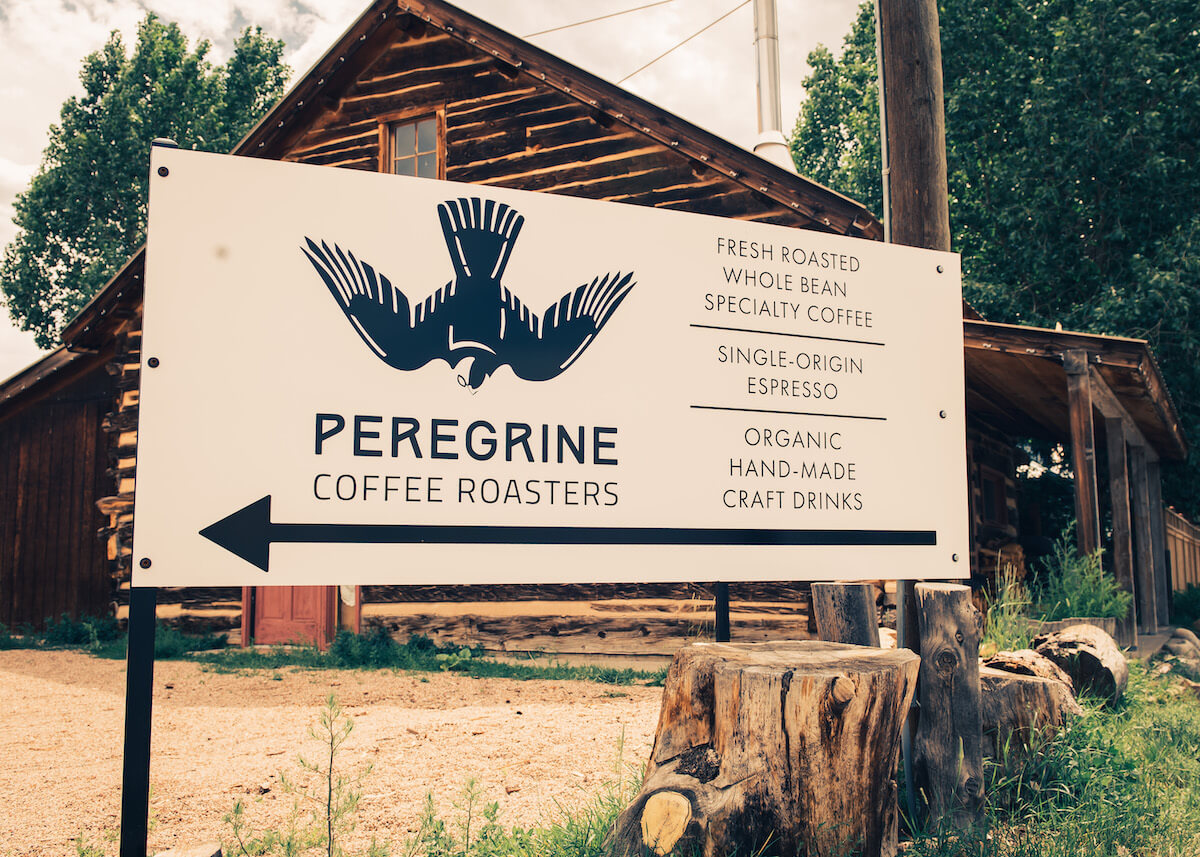
Stephen Holmes
Owner & Head Roaster

Main Peregrine Coffee Roasters Sign
Photograph by Steve Willis
At Peregrine we are constantly pondering the future of coffee. Are there new and exciting inventions that could change coffee forever? Maybe there are some undiscovered beans somewhere that have pure sugar, chocolate, nuts and fruit at their center? Perhaps there is a roasting technique that will automatically maximize a coffee’s flavor…
While these ideas are exciting to ponder, many of us know they are “coffee science-fiction.” Honestly, hoping and dreaming about making new discoveries that could change coffee forever is a McDonald’s mindset. We want the easy fix—“our way, right away.” But what must be done in the third wave of specialty coffee is not available in a drive-thru.
This investigative process is part of the journey we are welcoming you into at Peregrine. It is a journey that involves answering a far less esoteric question: What basic changes can we as coffee roasters make to improve the coffee industry?
The answer might seem old fashioned. We can do the hard work to actually know our coffee farmers on a personal level. I don’t just mean we should know their names so that it can go on the bags we sell. I mean that we should learn their birthdays, the names of their spouses and children, and spend time in their houses telling stories. Until we walk over the soil that their ancestors have cultivated for generations and have the epiphany that produces gratitude we are missing a vital component of who we are.
However, I’ve learned over the years that there are major dynamics at work which prohibit this simple answer from becoming many of our realities.
Tilling the Soil of A Coffee Biz
The coffee industry is the result of a symbiotic connection between money and relationships. We should have a thorough understanding of the dynamics of the third-world economic crises and how much they relate to our inflated product in the first world, but it is very complicated to achieve this. Simply put, getting to know our farmers costs a lot of money and takes a lot of time. This is something that can only be learned via experience in the profession, which takes time, and cannot be manipulated. Many of us are victims of a society that allows little time for such things, and also teaches us that money should be spent elsewhere.
For many of us who’ve opened a coffee roastery/café, our experience likely resembles the following:
The first year, you work two jobs just to keep your fledgling coffee business afloat. You don’t know anyone who is a coffee farmer or even where to get coffee from and you don’t have the money to figure it out.
The second year, you do your best to stay open and start learning about companies to source through, but you still don’t have the money to meet a real coffee farmer.
The third year you might be making enough money to live, but your green coffee sourcing is still mostly dependent upon large companies of which you’ve become reliant because you still can’t afford to travel to Guatemala and get to know “said coffee farmer.”
The fourth year is the fulcrum year. You are suddenly making money and you spend a lot of time pondering how you can achieve that idea of direct trade you once held dear. This year is the fulcrum because you have tipped over the money edge. You are now a somewhat self-sustained operation money-wise, but unless you are extremely devoted to that direct-trade principle, it falls into hindsight behind the simple fact that you need more man power.
So, you hire a couple people to help you and pay them well so that you can all work towards direct trade together. It almost feels like one step forward, two steps back, and it can be unless you turn the tide during this year and hone in one the bullseye of what the third wave is supposed to be—and that means taking the time and spending the money to make real relationships with farmers on their soil. It’s this year that many lose sight of that principle that you based your business upon, or you decide to buck the system that is seeking to turn you into being a specialty coffee roaster by name alone.

Enjoying coffee in a white Peregrine mug
Photograph by Steve Willis
Peregrine was at that point last year. Business was easy. We were cool and trendy. We started having a name. But, in the midst of this success I felt that deeper longing that had been planted in the seedbed of Peregrine from day one. It was a nagging question. How will we continue to be who we say we are?
I speak from a place of raw experience—still scabbed over from the wound of these many years as I see we are still caught in the midst of our cultures inescapable leeching of time and money. But can we transcend this, is the question? We believe we can.
We are currently seeking new business opportunities to provide the funds to pursue what we said we would in the beginning. This is our fifth year at Peregrine, and we are determined to unearth the essence of who we are as specialty coffee roasters. We are compelled to not fall prey to replicating second wave ideals.
Leaps and Bounds Ahead
Many of us know that there is still so much hard work to be done in the industry for third wave to unwaveringly declare that we are what we say we are. We must at least be on a path to what is mentioned above in order to not become a victim of being a specialty coffee roaster by name alone. This standard of accountability must be across the board before the term “fourth wave” is even considered.
In the next post, I will tell the actual story of what made us different from the beginning. Journey with me through the last five years with emphasis on our relationship to farmers and how we’ve met real challenges and challenged the boundaries on certain things. I will also tell you how we plan to hack the system with our funds and time to be true to who we are.

Peregrine Roasters owner Stephen Holmes trying to imitate a peregrine falcon
Photograph by Steve Willis

0 Comments